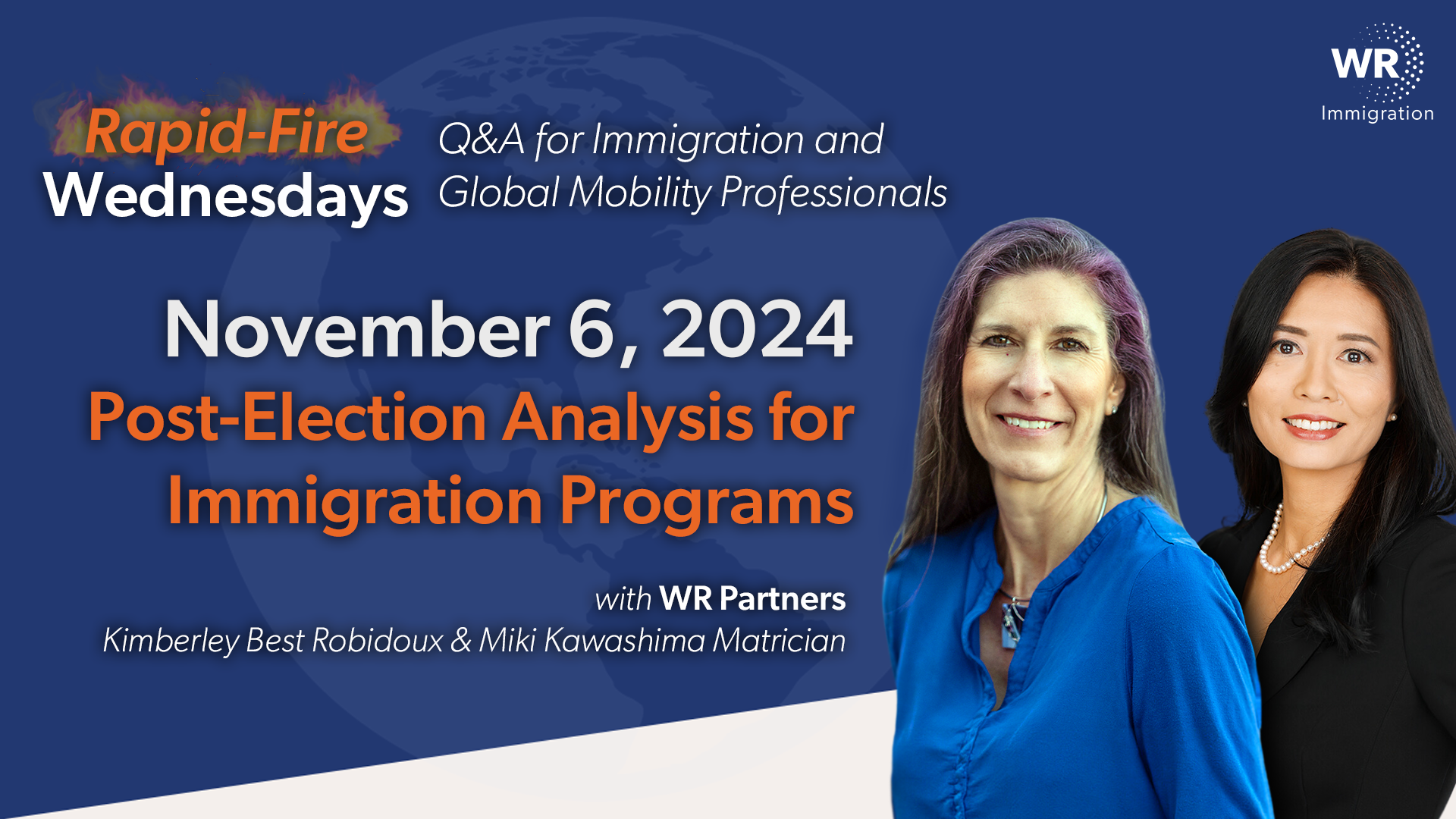The transcript version of our weekly Q&A livestream for corporate immigration professionals
By Kimberley (Best) Robidoux & Miki Kawashima Matrician
🔥 Question: What were the policies from the prior Trump administration on employment-based immigration?
Response: The previous Trump administration largely focused on restricting immigration, including employment-based immigration. This led to a spike in requests for evidence and denials, even for what had traditionally been straightforward petitions. One significant change was the repeal of the deference policy, which had previously granted deference to extension cases in which prior petitions had previously been approved, thereby increasing scrutiny or the extension cases. With this repeal, the number of requests for evidence and denials increased substantially.
🔥 Question: How did the previous Trump administration’s stance impact companies employing foreign workers?
Response: The general approach discouraged companies from hiring foreign workers. On the humanitarian side, the upcoming Trump administration has expressed plans for the largest deportation operation in U.S. history, which could lead to mass deportation camps due to limited space in detention facilities. Programs like Temporary Protected Status (TPS), visas (U and T) for crime victims, and even DACA might face significant restrictions or elimination, impacting numerous individuals and organizations.
🔥 Question: Are there specific employment-based immigration programs that might be affected?
Response: We are closely watching programs like STEM OPT and H-4 EADs. Although dismantling these programs would likely require going through the regulatory process, they may still be at risk. Additionally, we expect an increase in requests for evidence, especially for H-1B and L-1 visas. For H-1Bs, we anticipate new regulations favoring sponsorship of positions higher salaries, which could further challenge employers attempting to sponsor employees, especially new graduates from U.S. universities and colleges. There may also be a return to the public charge rule, adding extra steps and documentation to the green card application process for employment-based classifications.
🔥 Question: What about travel policies? Could travel bans return?
Response: Travel bans are a very real possibility, especially for countries previously subject to these bans. We are also on the lookout for travel restrictions related to geopolitical conflicts. As a precaution, we are strongly advising foreign national employees to limit international travel in early 2025, even for those with valid visas and travel documents.
🔥 Question: How could the public charge rule impact the green card process?
Response: Should the public charge rule return, it would add to the required documentation for family-based green card cases, as well as for employment-based green card cases, even if these employees are well paid. This extra step could slow the process significantly, especially if combined with a requirement for in-person interviews at a local USCIS office for all green card applicants, as was mandated during the previous Trump administration.
🔥 Question: What can HR and global mobility professionals expect regarding the Project 2025 plan in relation to immigration processes?
Response: Project 2025, part of the Republican initiative, includes potential mandates for enrollment by all employers in E-Verify which, while there is no cost to participate in the program, would require administrative oversight at the employer organization and therefore additional administrative costs. Additionally, Project 2025 advocates for a merit-based immigration system favoring higher-paid or highly educated candidates. We also expect potential eliminations of DACA and stricter fraud detection measures, which could introduce veto power by such a fraud detection unit over certain employment-based petitions.
🔥 Question: How can HR and global mobility professionals prepare before the inauguration in January?
Response: We recommend auditing employee populations to determine if any petitions for amendments or extensions may and/or should be filed with USCIS, including considering filing cases earlier than usual, especially if facing cases that might be scrutinized under a Trump administration. For National Interest Waivers (NIW) (permanent resident cases), filing these cases soon may be wise, as the window for such filings could close with the new administration.
🔥 Question: Should employers conduct I-9 and other internal compliance audits?
Response: Now is an ideal time to ensure worksite compliance files are in order, including Labor Condition Application (LCA) public access files, PERM audit files, STEM OPT audit files, as well as H-2A and H-2B audit files. Reviewing these documents will help ensure your worksite compliance program(s) is/are ready for any potential changes or audits by the government.
🔥 Question: How should organizations prepare to “fight” erroneous denials and/or delays?
Response: We highly recommend having a litigation attorney on retainer, as businesses were successful in suing the government agencies for denied cases and delays during the previous Trump administration. Reviewing immigration budgets to account for additional delays and litigation costs is also a proactive step.
🔥 Question: Can you sum up key strategies for global mobility and immigration professionals going forward?
Response: Key strategies include filing cases early (NOW), prioritizing National Interest Waivers or O-1 cases, and advising foreign nationals on the risks of international travel in early 2025. Lastly, review the immigration program for workforce members employed pursuant to n TPS, DACA, or parole programs, as these programs may face significant disruption and it is important to be aware of any potential disruptions of business operations if such individuals lose their work authorization/status.
Send us your questions via DM or using the below link!
HR Question Submission Form | Rapid-Fire Wednesdays
See you next week!


